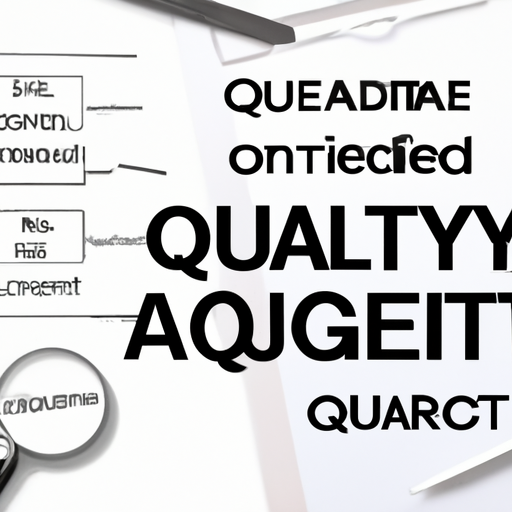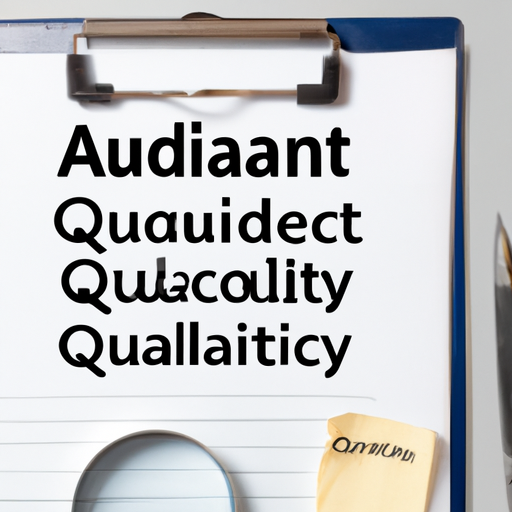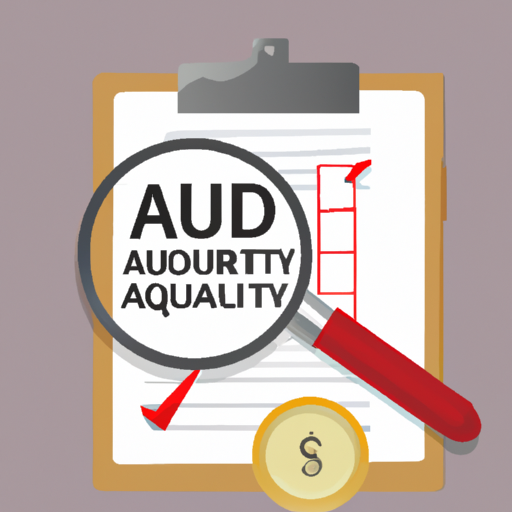Quality Auditor Job Description: Ensuring Excellence in Every Detail
In today’s rapidly evolving business landscape, maintaining the highest standards of quality has become imperative for organizations across industries. To ensure the integrity and efficacy of their products and services, businesses rely on individuals who possess meticulous attention to detail, exceptional analytical skills, and an unwavering commitment to excellence: quality auditors. Responsible for evaluating and scrutinizing organizational processes, systems, and practices, quality auditors play a crucial role in enhancing and maintaining quality standards. This article delves into the intricacies of a quality auditor’s job description, shedding light on the key responsibilities, required skills, and career prospects this profession entails. Whether you aspire to become a quality auditor or seek insight into the vital role they play in organizational success, read on to explore the world of quality auditing.
Table of Contents
- Responsibilities and Duties of a Quality Auditor
- Necessary Skills and Qualifications for a Quality Auditor
- Understanding the Role of Quality Auditor in Ensuring Compliance
- Importance of Precision and Attention to Detail in Quality Auditing
- Implementing Effective Quality Assurance Strategies as a Quality Auditor
- Building Strong Communication Channels as a Quality Auditor
- Utilizing Technology and Software in Quality Auditing Processes
- Continuous Improvement and Professional Development Opportunities for Quality Auditors
- Wrapping Up

Responsibilities and Duties of a Quality Auditor
A quality auditor is a crucial role in ensuring that an organization maintains high standards of quality in its products or services. This role involves conducting thorough audits, inspections, and quality control checks to identify any deviations from established quality standards and recommend corrective actions. The may vary depending on the industry, but here are some common tasks they typically perform:
1. Conducting audits: A quality auditor is responsible for planning, organizing, and conducting internal audits to assess the effectiveness and efficiency of an organization’s quality management systems. This includes reviewing documentation, interviewing staff, and observing processes to identify areas of improvement or non-compliance.
2. Documenting findings: After conducting audits, a quality auditor must document their findings, including any non-conformities or deficiencies, in a clear and concise manner. They should analyze the root causes of these issues and provide recommendations for corrective actions to management and relevant stakeholders.

Necessary Skills and Qualifications for a Quality Auditor
As a quality auditor, possessing the necessary skills and qualifications is imperative to ensure the accuracy and efficiency of the auditing process. To excel in this role, you should have a keen attention to detail and be well-versed in quality management systems. Familiarity with industry standards such as ISO and AS9100 is highly desirable.
In addition to technical expertise, effective communication skills are crucial for interacting with various stakeholders and conveying audit findings succinctly. Strong analytical abilities are essential for comprehensively assessing data and identifying areas for improvement. Furthermore, an ethical mindset is vital to maintain objectivity and impartiality throughout the auditing process, ensuring integrity and credibility in your work.
- Attention to detail: An eye for detail and an ability to identify discrepancies and potential issues is essential.
- Knowledge of quality management systems: Familiarity with QMS concepts and practices is necessary to evaluate and enhance processes.
- Understanding of industry standards: Proficiency in ISO and AS9100 standards ensures compliance and quality assurance.
In addition:
- Effective communication skills: Clear and concise communication is vital when interacting with stakeholders and presenting audit findings.
- Analytical abilities: Strong analytical skills enable you to make data-driven decisions and identify areas for improvement.
- Ethical mindset: Maintaining objectivity and impartiality is crucial to uphold integrity and credibility in the auditing process.

Understanding the Role of Quality Auditor in Ensuring Compliance
A quality auditor plays a crucial role in ensuring compliance within an organization. Their primary responsibility is to thoroughly inspect and assess various processes, systems, and procedures to guarantee that industry standards and regulations are being met. By conducting regular audits, quality auditors meticulously examine all aspects of a company’s operations to identify any deviations or non-compliance issues.
To effectively carry out their duties, quality auditors utilize a wide range of tools and techniques. These may include review of documentation, interviews with personnel, observation of processes, and analysis of data. By employing these methods, auditors are able to identify possible risks, gaps in compliance, and areas for improvement within the organization.
- Conducting audits to verify compliance with industry standards and regulations.
- Thoroughly inspecting and assessing processes, systems, and procedures within an organization.
- Reviewing documentation, interviewing personnel, observing processes, and analyzing data to identify non-compliance issues.
- Identifying risks and areas for improvement within the organization.
Ultimately, quality auditors play a critical role in maintaining the integrity and reputation of an organization. By ensuring compliance, they help protect the interests of both the company and its stakeholders. They are key contributors to the overall success and sustainability of a business. With their expertise and attention to detail, quality auditors help organizations continuously improve and meet the highest levels of quality and compliance.
Importance of Precision and Attention to Detail in Quality Auditing
Quality auditing is a crucial aspect of ensuring that products or services meet the required standards and regulations. In this regard, precision and attention to detail play a pivotal role in the success of a quality auditor.
1. Accuracy in Documentation: A quality auditor must possess excellent attention to detail to ensure that all documentation related to quality audits is accurate and comprehensive. This includes capturing information about any deviations from established procedures, identifying potential risks, and documenting any corrective actions. Precision in documentation guarantees that all findings are accurately recorded, providing a clear understanding of the current state of quality within the organization.
2. Thorough Examination: Precision and attention to detail are essential when examining processes and procedures during a quality audit. A quality auditor must assess every aspect of the organization’s operations to identify any areas that need improvement or potential risks. By keenly observing and analyzing various factors, such as workflow, documentation, and compliance with regulations, a quality auditor can uncover hidden issues and propose effective solutions.
Implementing Effective Quality Assurance Strategies as a Quality Auditor
Post Section:
As a quality auditor, it is crucial to implement effective quality assurance strategies for ensuring compliance and optimizing processes within an organization. By utilizing a systematic and thorough approach, quality auditors play a critical role in maintaining high standards and improving overall quality control.
To effectively implement quality assurance strategies, quality auditors must first assess and understand the unique requirements and regulations of the industry in which they operate. This involves conducting comprehensive research and staying up-to-date with industry standards, best practices, and regulatory guidelines. By having a solid knowledge base, quality auditors can develop customized strategies that align with the organization’s goals while adhering to regulatory requirements.
- Identify Key Areas for Inspection: Quality auditors need to identify key areas and processes that require thorough inspection. This can range from product manufacturing to supply chain management, from customer service to internal communication systems. By focusing on these areas, auditors can detect potential non-compliance issues and areas for improvement.
- Develop and Implement Audit Plans: After identifying critical areas, quality auditors must create detailed audit plans. These plans outline the objectives, scope, and methodologies to be followed during the audit process. By developing a structured approach, auditors can efficiently evaluate processes and identify areas that need special attention.
- Perform Comprehensive Evaluations: Quality auditors conduct meticulous evaluations through audits and inspections. This involves conducting interviews, reviewing documentation, and observing processes to identify non-compliance, potential risks, and areas of improvement. By performing rigorous evaluations, auditors can provide valuable feedback to management and stakeholders.
- Create Actionable Reports: Following audits, quality auditors produce clear and concise reports that outline their findings and recommendations. These reports highlight areas of non-compliance, potential risks, and provide actionable solutions to improve quality control. By communicating their findings effectively, auditors facilitate decision-making and encourage continuous improvement.
Overall, implementing effective quality assurance strategies requires the expertise, attention to detail, and systematic approach of a quality auditor. By constantly evaluating and improving internal processes, quality auditors contribute to achieving organizational excellence and maintaining customer satisfaction.
Building Strong Communication Channels as a Quality Auditor
As a quality auditor, one of the key aspects of your role is to build strong communication channels with various stakeholders. Effective communication is paramount in ensuring that quality standards are met and maintained throughout the organization. By fostering open lines of communication, you can collaborate more efficiently, address any concerns or issues promptly, and promote a culture of continuous improvement.
To accomplish this, it is essential to utilize various communication methods and tools. Whether it is through face-to-face meetings, email correspondence, or virtual communication platforms, it is crucial to tailor your approach to suit the specific needs of each stakeholder. Utilize clear and concise language while conveying complex information, ensuring it is understood by all parties involved. Additionally, make sure to actively listen to others, encouraging them to express their thoughts and concerns. This will not only foster a sense of inclusion but also provide valuable insights into potential quality issues that may arise.
Building strong communication channels also involves establishing effective feedback mechanisms. Encourage open and transparent communication by providing avenues for employees to provide feedback, suggestions, or report any potential quality concerns. This can be done through regular team meetings, suggestion boxes, or online platforms where employees can share their thoughts anonymously. Actively acknowledge and address their feedback, ensuring that it is acted upon promptly. By implementing these measures, you can establish a culture of trust, collaboration, and continuous improvement throughout the organization.
Utilizing Technology and Software in Quality Auditing Processes
The role of a quality auditor has evolved significantly in recent years with the advancements in technology and software solutions. Utilizing these tools plays a pivotal role in enhancing the efficiency and effectiveness of quality auditing processes. With the implementation of software and technology, quality auditors are able to streamline their tasks, ensure accuracy, and improve overall productivity.
One of the key benefits of incorporating technology in quality auditing is the ability to automate various manual tasks. Software solutions can be utilized to automate the collection and analysis of data, eliminating the need for manual data entry and reducing the chances of human error. By automating these processes, quality auditors can significantly save time and focus on higher value-added activities. Moreover, utilizing technology allows for real-time monitoring and reporting, ensuring that any issues or discrepancies are promptly identified and addressed.
Another advantage of utilizing technology and software in quality auditing is the ability to create comprehensive and detailed audit reports. Through specialized auditing tools, auditors can generate customizable reports that provide key insights and recommendations. These reports can be easily shared with relevant stakeholders, aiding in effective decision-making and continuous improvement efforts. Additionally, software solutions enable auditors to maintain a centralized audit database, allowing for easy retrieval and tracking of audit findings and corrective actions.
In conclusion, the integration of technology and software in quality auditing processes has revolutionized the role of a quality auditor. By automating tasks, ensuring accuracy, and generating comprehensive reports, technology empowers auditors to enhance the quality of audits and contribute to the overall success of the organization.
Continuous Improvement and Professional Development Opportunities for Quality Auditors
Continuous improvement and professional development opportunities are crucial for quality auditors to enhance their skills and stay updated in a dynamic business environment. As a quality auditor, it is essential to have a strong foundation of knowledge and expertise in auditing principles, techniques, and processes. However, to be truly exceptional in this role, ongoing learning and self-improvement are key.
At XYZ Company, we recognize the importance of providing our quality auditors with a range of opportunities for growth and development. We offer a comprehensive training program that is designed to address the specific needs and requirements of our quality auditors. This program encompasses a variety of topics, such as advanced auditing techniques, quality management systems, risk assessment, and industry standards.
- Our quality auditors have access to regular workshops and seminars conducted by industry experts, allowing them to stay updated on emerging trends and best practices.
- We encourage our auditors to pursue professional certifications, such as Certified Internal Auditor (CIA) or Certified Quality Auditor (CQA), and provide financial support and study materials for these certifications.
- In addition, we have a mentorship program in place, where experienced auditors provide guidance and support to new auditors, fostering a culture of knowledge sharing and continuous improvement.
We believe that investing in the professional development of our quality auditors is not only beneficial for them but also for our organization as a whole. By ensuring that our auditors have access to continuous improvement opportunities, we are confident in maintaining our high standards of quality and delivering exceptional results to our clients.
Wrapping Up
In conclusion, the role of a quality auditor in any organization is indeed crucial in ensuring and maintaining high standards of quality control. The responsibilities of a quality auditor encompass a wide range of tasks that revolve around monitoring, evaluating, and reporting on the various processes and procedures in place. By meticulously inspecting and analyzing various aspects of operations, products, and services, quality auditors play a pivotal role in safeguarding the reputation, credibility, and ultimately the success of the organization. Their meticulous attention to detail, analytical skills, and ability to communicate effectively are essential qualities for performing this role effectively. As organizations continue to evolve and thrive in an increasingly competitive environment, the role of quality auditors becomes ever more indispensable in driving continuous improvement and upholding the highest standards of quality.
